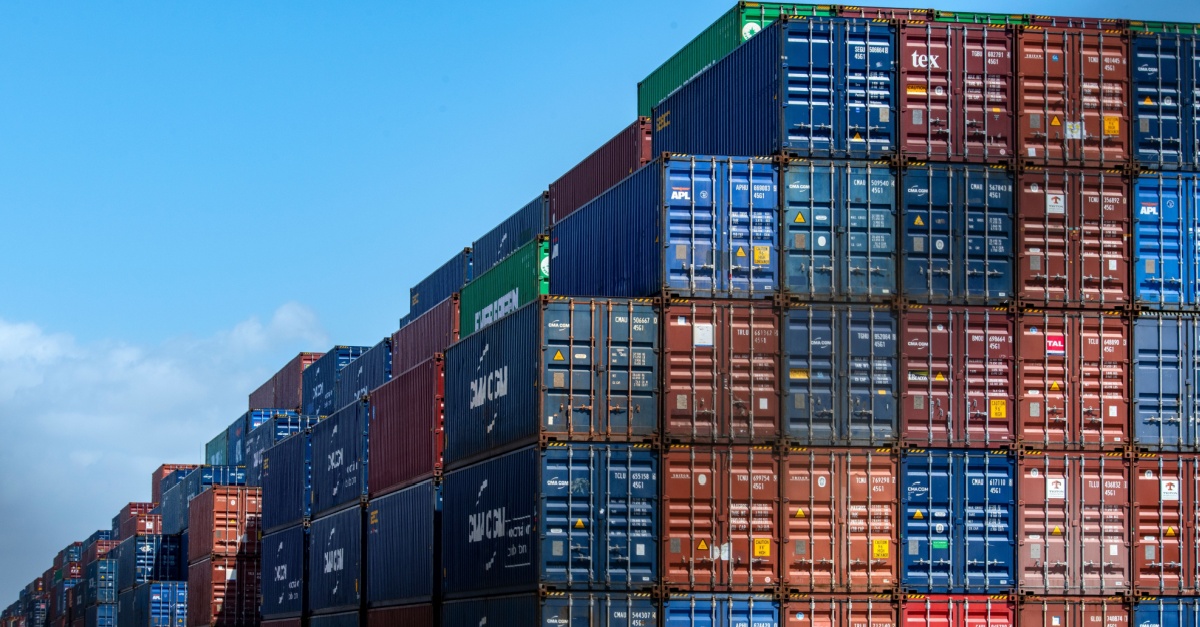July marked a pivotal moment for North American supply chains, as a combination of surging imports, evolving trade policy, and operational recalibration converged. U.S. containerized imports surged to near-record levels, driven by companies rushing to meet impending tariff deadlines.
At the same time, cargo volumes from China rebounded sharply, despite the ongoing geopolitical tensions. The U.S. extended its pause on new tariffs on China, offering temporary relief as trade talks progress. Meanwhile, logistics giants are adapting fast.
Continue reading to learn more about the critical stories shaping the freight market.
Containerized Imports Hit 2.62M TEUs in July
U.S. ports handled 2,621,910 TEUs in July, up 18.2% from June and 2.6% from the same period last year, narrowly missing the May 2022 record. Descartes Datamyne attributed the spike to peak-season demand and accelerated shipments ahead of tariff changes. Imports from China climbed 44.4% month over month to 923,075 TEUs, their highest level since January — boosting China’s share of U.S. imports to 35.2%.
New tariffs enacted in August range from 10% to 41% on goods from more than 60 countries, with China also facing flat-rate fees on low-value items. Miami led port growth with a 35.5% monthly gain, followed by Houston, Oakland, and Savannah. Analysts warn that without tariff relief or trade agreements, China’s share could slip again, despite broad port gains and long-term growth above pre-COVID levels.
DSV Slows US-Mexico Expansion as Tariffs Cool Trade Growth
DSV, the world’s second-largest logistics provider after Amazon’s logistics arm, has paused its planned cross-border trucking expansion and slowed other U.S.-Mexico border investments due to a tariff-driven slowdown in trade. CEO Jens H. Lund said that “the growth has gone out of it,” as the company awaits clarity on U.S. trade policy with Mexico.
DSV’s move follows rapid growth in recent years, including doubling border warehousing capacity and tripling the size of a facility in Brownsville, Texas. Mexico became the United States’ top trading partner in 2024, with $840 billion in trade, but tariff extensions on goods like cars and steel have softened manufacturing and logistics activity. Despite the slowdown, DSV posted Q2 operating profit of $722 million, up 15% year over year.
US Extends Pause on Additional China Tariffs
President Donald Trump has extended the suspension of additional retaliatory tariffs on Chinese imports until November 10, citing “significant steps” taken by China to address U.S. trade concerns. Since May 14, the U.S. has imposed an additional 30% duty on many Chinese goods, 20% tied to fentanyl trafficking and 10% as a baseline reciprocal tariff.
China responded by cutting its 34% tariff to 10% for the next 90 days. The move follows July trade talks in Stockholm and is linked to a pending deal framework that could see the U.S. impose total tariffs of 55% on Chinese imports. China accounted for 10.9% of U.S. trade in 2024, with a $295 billion trade deficit, underscoring its continued central role in global supply chains.
FedEx Freight Spin-Off to Reshape Bundled Shipping Contracts
FedEx’s plan to spin off its less-than-truckload unit, FedEx Freight, by June 2026 is set to alter many customer agreements, particularly for smaller shippers that benefit from bundled parcel and LTL contracts. These deals tie LTL spending to parcel delivery discounts, enabling shippers to earn lower last-mile rates by increasing their total spend.
As the spin-off nears, FedEx is already urging customers with significant LTL volumes to move to stand-alone agreements, which could erode these bundled savings. Experts warn that parcel-heavy shippers with minimal freight needs may switch to lower-cost LTL carriers, as FedEx Freight is known for premium pricing. FedEx says ensuring a smooth transition remains a top priority.
Q2 Cargo Thefts Surge in US and Mexico
Cargo theft incidents in the U.S. rose 33% year over year in Q2 2025 to 525 cases, with California accounting for 38%, primarily driven by activity around Los Angeles and Long Beach. Texas (21%), Tennessee (15%), Pennsylvania (10%), and Illinois (7%) also saw spikes. Electronics were the top target, with mixed loads (29%), batteries/panels (18%), and computers (14%) leading theft categories.
Pilferage accounted for 52% of incidents, while full-truckload thefts, primarily in Texas, made up 22%. In Mexico, 82% of thefts involved violence, with Puebla and the state of Mexico comprising more than 43% of cases. Food and beverage goods were the most stolen (33%), followed by building and industrial materials (10%).
Navigate the Freight Crisis with Wicker Parker Logistics
In times of supply chain uncertainty, having an expert partner at your side is essential — and that’s exactly what Wicker Parker Logistics delivers.
With decades of industry experience, advanced logistics and transportation technology, and a consultative approach, we provide on-demand transportation across FTL, LTL, flatbed, hot-shot, and reefer. Every shipment comes with full, end-to-end visibility, so you can track progress in real time and act with confidence.
Contact us for a quick quote today.















